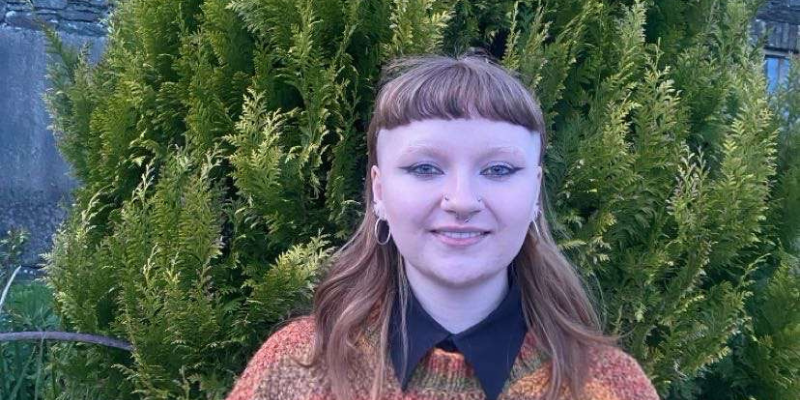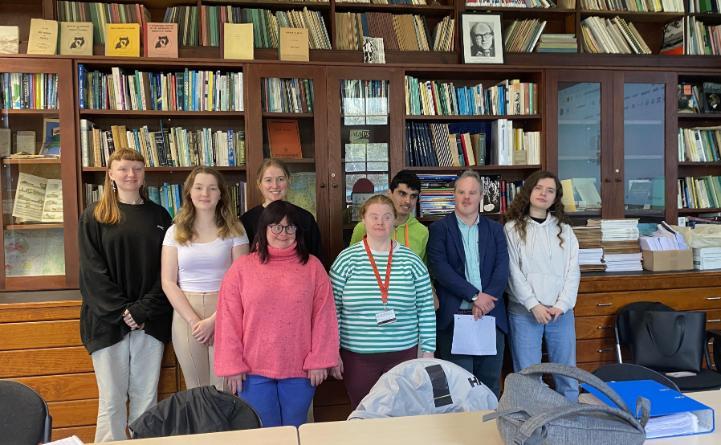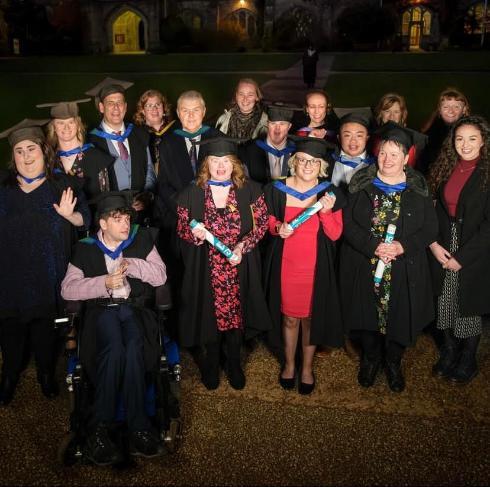In This Section
Reimagining Cities: UCC BA in Geography and Sociology graduate Ruby Walsh

- Q&A with Ruby Walsh who graduated from UCC with a First Class Honours degree in Geography and Sociology.
- As a Bachelor of Arts (CK101) student, Ruby developed a strong interest in addressing social and urban issues.
- Ruby shares her Arts academic journey and advice to students considering a Bachelor of Arts.
Ruby Walsh graduated from University College Cork with a First-Class Honours Bachelor of Arts degree in Geography and Sociology. As a BA (CK101) student, Ruby developed a strong passion for understanding and addressing social and urban issues.
Ruby engaged in extensive projects, including the id+ project in which students with intellectual disabilities join degree students through a co-learning modules Cities of Diversity and Sustainable Cities & Communities.
This year, Ruby has started a new chapter as she pursues a Master of Science in Redesigning the Post-Industrial City (RePIC). Ruby was awarded a prestigious Eramus Mundus scholarship for the RePIC MSc, which will enable her to explore sustainable urban development and innovative city planning.
Ruby, as an BA undergraduate student, your dissertation explored third spaces for people with intellectual disabilities and now you are a RePIC masters student exploring the future of sustainable cities. When did you develop this great interest in addressing urban and social issues?
I have always been fascinated by how cities function—the constant movement, the vibrant atmosphere, observing how people interact and how these interactions shift depending on the space they are in. It was not until studying Geography and Sociology through Arts at UCC that I realised how complex these dynamics are, especially for marginalised communities. Through my involvement with the id+ project and my dissertation on third spaces for people with intellectual disabilities, my understanding of the need for inclusivity deepened. My interest shifted from simply observing cities to wanting to actively address urban and social issues.
What skills gained from studying Arts have been most useful in your academic journey so far?
One of the most important skills I developed during my Arts studies was teamwork. Through UCC's intellectual disability project, I learned to collaborate across diverse groups, creating inclusive environments where all voices are heard. This experience is crucial in sustainable urban planning, which requires engaging with a range of stakeholders—community members, policymakers, and architects—to design spaces that work for everyone. My ability to foster inclusivity and work toward shared goals will be essential as I aim to create urban environments that are not only sustainable but also equitable and accessible.

Ruby Walsh (left) pictured with fellow peer buddies and students from the id+ project working on a project together.
Data collection and analysis was another skill I acquired while studying for my BA. As part of my dissertation, I interviewed students with intellectual disabilities and analysed their responses, this informed me on how to gather and interpret qualitative data. This skill directly applies to my work in sustainable cities, where understanding the needs of diverse urban populations is crucial. Whether assessing the impact of urban design on marginalised communities or evaluating the inclusivity of public spaces, my ability to collect and analyse data will guide me in developing informed, people-centred solutions.
What advice would you give to current secondary school students considering a Bachelor of Arts?
I highly recommend pursuing a Bachelor of Arts. Its flexibility and diversity allow you to explore a range of subjects, helping you discover what truly interests you while building a broad skillset. For me, studying Geography and Sociology deepened my understanding of how societies function and how cities are shaped—something I had always been curious about.
An Arts degree equips you with critical thinking, communication, and research skills, valuable in any career. If you are unsure about a career path but love learning, a Bachelor of Arts opens so many doors. It offers many opportunities to find what resonates with you.
Go in with an open mind and seize every opportunity! When I started, I wasn’t sure what I wanted to do after graduation. But by immersing myself in the course and pursuing subjects I enjoyed, I found my passion. This led me to apply for and receive the Erasmus Mundus Scholarship for the RePIC MSc. You never know where it might lead, so take every chance!
Are there any particular experiences that helped you grow academically or personally during your time studying the BA at UCC?
One of the most impactful experiences during my time at UCC was my involvement with the id+ project. Collaborating with students with intellectual disabilities helped me grow personally, teaching me the importance of inclusivity and patience, and academically by sharpening my communication and teamwork skills. This experience will be invaluable for my work in urban planning, where engaging with diverse communities is essential.
Academically, one of my favourite modules was GG2010 Cities of Diversity, led by Dr. Therese Kenna. It focused on understanding the diverse nature of social life in contemporary cities and the complex processes of inclusion and exclusion in urban spaces. This module deepened my interest in sustainable cities and city planning’s role in addressing social inequalities, sparking my dissertation topic on inclusive third spaces for people with intellectual disabilities.
The combination of hands-on experience through the id+ project and engaging academic content has been crucial for my growth. It gave me the confidence and skills to apply for the RePIC MSc and explore my passion for designing more inclusive and sustainable urban environments.

Ruby Walsh (back right) joins lecturers and fellow peer buddies to celebrate the graduation of UCC id+ project students.
College of Arts, Celtic Studies & Social Sciences
Coláiste na nEalaíon, an Léinn Cheiltigh agus na nEolaíochtaí Sóisialta
Contact us
College Office, Room G31 ,Ground Floor, Block B, O'Rahilly Building, UCC
